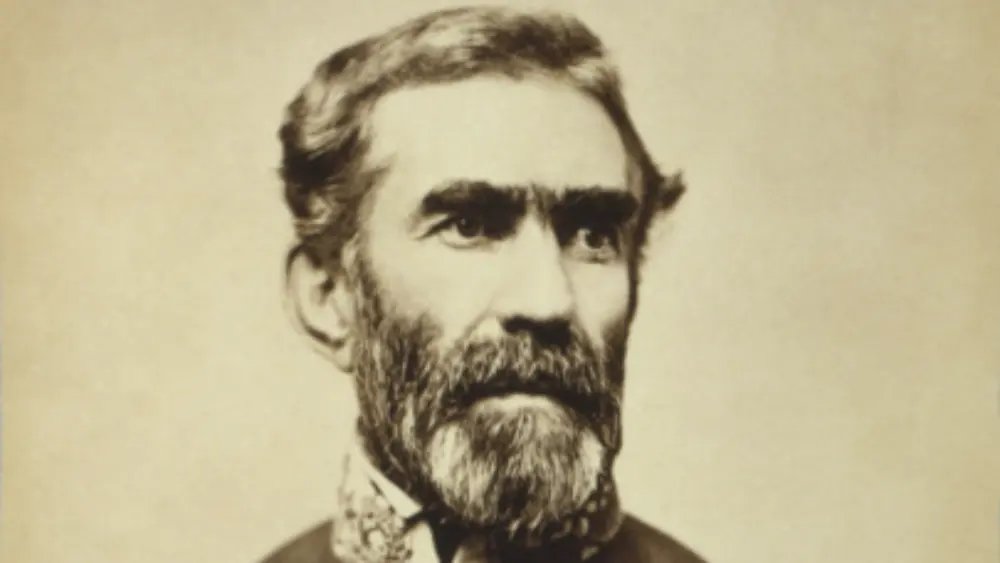Braxton Bragg, a prominent Confederate general during the American Civil War, played a crucial role as a military strategist for the Southern states. Born on March 22, 1817, in Warrenton, North Carolina, Bragg’s military career and leadership would become integral to the Confederate Army’s efforts.
Early Life and Military Education
Braxton Bragg’s early life and military education laid the foundation for a career marked by a steadfast dedication to service and strategic thinking. Born in 1817 in Warrenton, North Carolina, Bragg’s upbringing was influenced by the values of the Southern gentry. His military aspirations led him to the United States Military Academy at West Point, where he enrolled in 1833. Graduating in 1837, Bragg entered the U.S. Army, setting the stage for a trajectory that would see him serve in various capacities over the coming years.
Bragg’s education at West Point not only provided him with a strong foundation in military tactics and engineering but also instilled in him the principles of discipline and leadership. His formative years at the academy cultivated the skills that would prove essential in his future roles within the military. The training and experiences gained during this period equipped Bragg with the tools necessary to navigate the challenges of a rapidly changing nation and prepare him for the significant responsibilities that lay ahead in his military career.
Braxton Bragg: Mexican-American War and Interwar Years
Braxton Bragg’s experiences during the Mexican-American War in the 1840s marked a crucial period that provided him with valuable insights into military strategy and leadership. Serving as an artillery officer, Bragg distinguished himself through his tactical acumen and demonstrated an ability to effectively coordinate artillery units in the field. His performance in key battles, including the Battle of Buena Vista, garnered attention and earned him commendations for his contributions to the American victory. The Mexican-American War became a testing ground for Bragg’s military capabilities, shaping his reputation as a skilled and strategic officer.
In the interwar years that followed, Bragg continued to contribute to the military and the nation. Engaged in engineering projects, he applied his skills to various infrastructure developments, showcasing versatility beyond the battlefield. These years also provided Bragg with opportunities to further hone his leadership abilities, both in technical and administrative capacities. The experiences gained during this period played a crucial role in preparing Bragg for the challenges of the tumultuous Civil War that lay ahead, where he would play a significant role as a Confederate general.
Civil War Service and Early Successes
With the outbreak of the Civil War, Braxton Bragg aligned himself with the Confederacy, and his military skills quickly came to the fore. In the early stages of the conflict, Bragg played a notable role in the Western Theater, where his strategic vision and effective command earned him a reputation as a capable and skilled military leader. One of his early successes came at the Battle of Shiloh in April 1862, where Bragg, serving as a corps commander under General Albert Sidney Johnston, displayed tactical acumen. The surprise Confederate attack on Union forces on the first day of the battle initially achieved significant success, showcasing Bragg’s ability to formulate and execute complex military maneuvers.
Bragg’s success at Shiloh marked a notable contribution to the Confederate war effort and bolstered his standing within the Confederate Army. His strategic insights and decisive actions in the Western Theater positioned him as a commander with the potential to influence the course of the Civil War. However, despite these early triumphs, challenges and setbacks would later characterize Bragg’s leadership, leading to a more complex assessment of his overall contributions to the Confederate cause.
Braxton Bragg: Leadership of the Army of Tennessee
Braxton Bragg’s appointment to lead the Army of Tennessee marked a pivotal moment in his military career and had profound implications for the Confederate war effort. In this key leadership role, Bragg faced the daunting task of commanding one of the principal Confederate armies in the Western Theater. However, his tenure at the helm of the Army of Tennessee would be characterized by challenges and controversies. Bragg’s leadership style, marked by a rigid and often autocratic approach, contributed to strained relationships with his subordinates and created an atmosphere of discontent within the army.
Bragg’s strategic decisions also came under intense scrutiny. His campaign into Kentucky in 1862 and the subsequent Battle of Perryville, where he failed to decisively capitalize on potential advantages, were met with criticism. The Battle of Chickamauga in 1863, often considered one of Bragg’s most significant engagements, resulted in a Confederate victory but failed to exploit the full potential of the situation. The internal dissension within the Army of Tennessee, combined with the strategic challenges faced under Bragg’s leadership, ultimately had a lasting impact on the Confederate war effort in the Western Theater.
Challenges and Setbacks
Despite early successes in the Civil War, Braxton Bragg faced significant challenges and setbacks, particularly at the Battle of Chattanooga in late 1863. The Confederate defeat at Chattanooga, marked by the battles of Lookout Mountain and Missionary Ridge, represented a turning point in Bragg’s military career. The Union forces, under the command of Generals Ulysses S. Grant and William T. Sherman, successfully orchestrated a series of coordinated attacks that forced Bragg’s army to retreat. The defeat not only had immediate strategic consequences but also led to a critical reevaluation of Bragg’s leadership and strategic capabilities.
The setbacks at Chattanooga intensified existing criticisms of Bragg’s leadership style, which had already strained relationships within the Confederate command. The defeat prompted Confederate President Jefferson Davis to make changes in command, relieving Bragg of his duties as commander of the Army of Tennessee. While Bragg had demonstrated early successes in the war, the challenges and failures in the later stages prompted a reassessment of his suitability for high command. The Battle of Chattanooga proved to be a decisive moment that significantly impacted the Confederate military strategy in the Western Theater.
Braxton Bragg: Role in Confederate High Command
After his removal from field command, Braxton Bragg continued to play a role in the Confederate high command, demonstrating his ongoing involvement in military planning and strategy. Despite the controversies surrounding his leadership during the Chattanooga campaign and earlier setbacks, Confederate President Jefferson Davis appointed Bragg as his military adviser and chief of staff in Richmond. In this capacity, Bragg contributed to the overall planning and coordination of Confederate military efforts, providing insights and counsel to the highest echelons of the Southern command structure.
Bragg’s role in the Confederate high command was not without controversy, and opinions on his contributions remained divided. While some acknowledged his experience and strategic thinking as valuable assets to the Confederate cause, others criticized his leadership style and questioned his suitability for such a prominent advisory role. Nevertheless, Bragg’s continued participation in the Confederate war effort underscored the complexities of military leadership during the Civil War, where the interplay of personalities, strategic considerations, and political dynamics shaped the course of the conflict.
Post-War Years and Legacy
After the Civil War, Braxton Bragg faced challenges in readjusting to civilian life. The defeat of the Confederacy and the loss of the Southern cause brought profound changes to the lives of many Confederate leaders, and Bragg was no exception. Following the conflict, he sought to rebuild his life and contribute to the healing of the nation. Bragg engaged in various endeavors, including serving as an engineer for the state of Alabama. However, the wounds of war, both physical and psychological, persisted, making the post-war years a period of personal and societal adjustment.
Bragg passed away on September 27, 1876, leaving behind a legacy that continues to be evaluated and debated. Despite the controversies surrounding his wartime decisions, particularly his leadership of the Army of Tennessee, Bragg is remembered as a key military strategist of the Southern states during the Civil War. His contributions, both in terms of victories and setbacks, played a role in shaping the course of the conflict in the Western Theater. The enduring legacy of Braxton Bragg serves as a reminder of the complexities and challenges faced by military leaders during one of the most tumultuous periods in American history.
Braxton Bragg: Complex Historical Assessments
Historical assessments of Braxton Bragg remain complex, with scholars and historians offering varied interpretations of his strategic decisions and leadership during the Civil War. Bragg’s military career is marked by a mix of successes and failures, including early triumphs in the Western Theater and the significant setbacks at the Battle of Chattanooga. The controversies surrounding his leadership style, characterized by a strict and sometimes autocratic approach, have contributed to a nuanced evaluation of his overall contributions to the Confederate cause.
Some historians emphasize Bragg’s tactical skill and strategic thinking, pointing to his successes in the early stages of the war and the complexities of the challenges he faced in the Western Theater. Others critique his decision-making, especially during critical moments such as the Battle of Chattanooga, arguing that his leadership deficiencies significantly impacted the Confederate war effort. The diverse perspectives on Bragg’s legacy underscore the challenges faced by military commanders during the Civil War and the intricate factors that shaped their actions on the battlefield. The complex historical assessments of Braxton Bragg reflect the ongoing dialogue within the academic community about the nature of leadership and decision-making in times of conflict.

Controversies and Personal Reputation
Bragg’s confrontational leadership style and strained relationships with fellow officers were key contributors to controversies during his military career. Known for his rigid and often autocratic approach, Bragg had difficulty maintaining positive working relationships within the Confederate command structure. The clashes with subordinates, including prominent generals such as Leonidas Polk and William J. Hardee, created an atmosphere of discontent within the Army of Tennessee. These internal dissensions were a significant factor in the challenges faced by the Confederate forces under Bragg’s command.
The defeats suffered under Bragg’s leadership, particularly at the Battle of Chattanooga, further tarnished his personal reputation. The Battle of Chattanooga marked a turning point, both strategically and personally, for Bragg. The inability to secure a decisive victory and the subsequent retreat damaged not only his standing within the Confederate Army but also contributed to a broader questioning of his capabilities as a military leader. The controversies surrounding his confrontational leadership style and the visible setbacks on the battlefield played a substantial role in shaping Bragg’s legacy, impacting how he was perceived by contemporaries and subsequent historical assessments.




